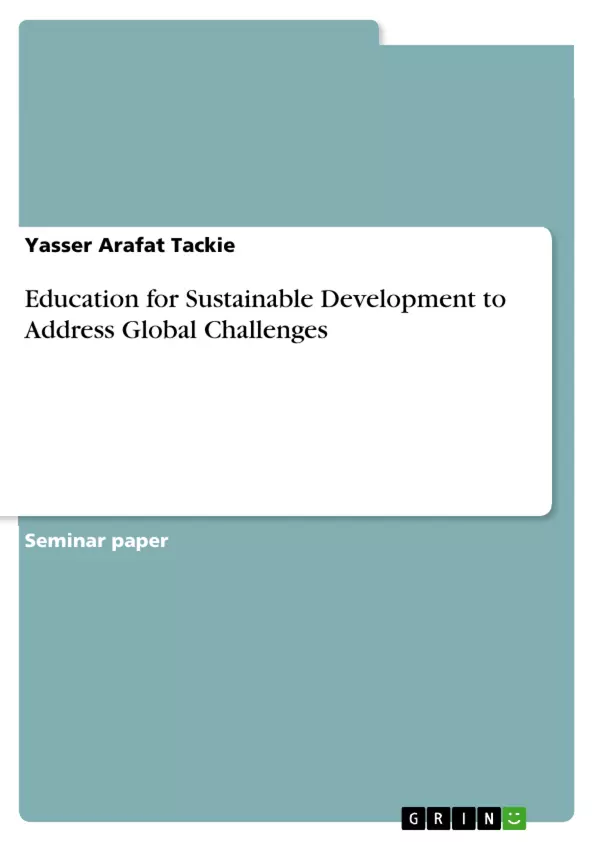This paper deals with the integration of Education for Sustainable Development (ESD) into educational systems to address global challenges such as climate change, biodiversity loss, and inequality. The focus is on the ESD for 2030 framework developed by UNESCO, which aims to embed ESD in policies, systems, and practices across all education levels by 2030. This framework emphasizes transformative actions, social transformation, and critical thinking to achieve the Sustainable Development Goals (SDGs). The paper also discusses the Germanwatch Handprint approach, which complements ESD by promoting structural changes and political commitment for sustainable actions. Methodologically, the paper examines the effectiveness of these frameworks through the lens of current educational practices, highlighting the gap between theoretical frameworks and practical implementation, particularly in the German educational context. The study underscores the necessity of transforming education systems to create enabling environments for learners to become change agents for social and ecological transformation.
Inhaltsverzeichnis (Table of Contents)
- Introduction
- Tools for behaviour changes and societal transformation
- Discussion
- Thesis 1: The creation of an enabling environment for learners to become change agents of a social- ecological transformation can only be achieved by transforming the education system.
- Thesis 2: Although there are existing various theoretical frameworks to promote Education for Sustainable Development, the practical implementation is severely lacking and ineffective.
Zielsetzung und Themenschwerpunkte (Objectives and Key Themes)
This paper explores the implementation of Education for Sustainable Development (ESD) and its potential to foster a more sustainable future. It examines the ESD for 2030 framework, the Dublin Declaration, and the Germanwatch Handprint approach, highlighting the need for transformative education and structural changes.- The role of education in achieving the Sustainable Development Goals (SDGs)
- Transformative action and societal change
- The importance of individual and collective action
- The need for a shift from traditional education systems to competency-based learning
- The challenges and opportunities of implementing ESD in educational institutions
Zusammenfassung der Kapitel (Chapter Summaries)
The introduction provides an overview of ESD, its goals, and the current global framework, ESD for 2030. It discusses the key principles and priorities of this framework, emphasizing its aim to integrate ESD into education systems by 2030. The introduction also mentions the Dublin Declaration, a forward-looking perspective on global education, and its emphasis on partnerships, curriculum reform, and the role of educators. The second section delves into the tools for behavior changes and societal transformation, comparing the ecological footprint and the Germanwatch Handprint approach. It highlights the limitations of the ecological footprint and the advantages of the Handprint approach in promoting positive actions and structural change. The discussion section focuses on two main theses. The first thesis argues that transforming the education system is crucial to create an enabling environment for learners to become agents of change for a sustainable future. It explores the need for competency-based learning, the importance of the Whole Institution Approach, and the role of educational institutions as role models. The second thesis examines the gap between theory and practice in ESD implementation, focusing on the German educational context. It presents key findings from studies and surveys on the current state of ESD in Germany, highlighting the need for greater integration of ESD principles into curricula and teacher training.Schlüsselwörter (Keywords)
This paper focuses on Education for Sustainable Development (ESD), transformative education, sustainable development goals (SDGs), the Dublin Declaration, the Global Action Programme on ESD (GAP), the Germanwatch Handprint, ecological footprint, whole institution approach, competency-based learning, and the challenges of implementing ESD in educational institutions.- Quote paper
- Yasser Arafat Tackie (Author), 2023, Education for Sustainable Development to Address Global Challenges, Munich, GRIN Verlag, https://www.grin.com/document/1493825



